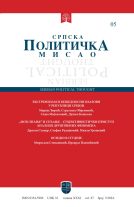- Home page
- Researchers
- Vera Arežina
Vera Arežina
Faculty of Political Science, Belgrade

RESEARCH METHODOLOGY IN POLITICAL SCIENCES
The subject of this paper deals with the research methodology in the political sciences, from definition of topic, research question, subject, goals, hypotheses, methods, as well as the justification of the research. A research question is part of a research problem that narrows this part to one or more specific questions from which the subject of research is derived. The subject of research, in addition to the theoretical determination, also refers to the spatial, temporal and scientific-disciplinary determination. According to the problems and subjects of the research, the goals of the research are performed, and they refer to new or verification of existing scientific knowledge. Hypotheses represent the basic assumptions about the subject of research. In this paper, we have pointed out the classification, formation and testing of hypotheses. Mixed methods are increasingly used in research when combining elements of qualitative and quantitative methods allows a better understanding of the subject of research. The justification of the research includes scientific, methodological and social contribution and is necessary for all types of scientific papers, and especially for doctoral dissertations due to new scientific knowledge. The aim of this paper is to describe and explain the methodology of scientific research that has been applied for decades in political science and other social sciences such as pedagogy, sociology, security, law and military sciences, and in the last decade in anthropology, medicine and in technical-technological, computer, mathematical and other sciences. The results of this paper should contribute to a better understanding of research methodology in scientific papers, especially in master's theses and doctoral dissertations, as well as to encourage young researchers to successfully conduct their research in political and other sciences.

A CONTRIBUTION TO THE RESEARCH ON THE REPRESENTATION OF WOMEN AT SIGNIFICANT SOCIAL POSITIONS IN THE REPUBLIC OF SERBIA
In this paper we have shown how much the role of women has changed since the period between the two world wars and gaining the right to vote after the Second World War in Serbia. We pointed out that in the last twenty years many documents have been adopted, such as the Law on Gender Equality, the Labor Law, the Law on Prevention of Harassment at Work, the Law on Prohibition of Discrimination and others, seminars and conferences have been held, although many women in Serbia are, to a certain extent occasionally still facing some sort of discrimination and various forms of violence, including domestic violence. During April 2020 this research was conducted on 710 recipients of the survey by undergraduate students of second year of studies and academic staff of the Faculty of Political Sciences in Belgrade in order to describe and explain citizens' attitudes regarding the representation of women in important social positions in Serbia. Although the survey conducted on only 710 recipients would rather applies for publishing its results in an academic journal of some of the faculties of social sciences in the Republic of Serbia, we thought that still on micro-plan it is a contribution to the preview of current status of the women in contemporary Serbian society. The idea of the research was to check how much the legislative acts related to the topic of this paper are actually applied. Some of the conclusions of the research show that male respondents consider professional qualification and work experience important, but also physical appearance, marital and parental status when employing women. Respondents believe that women in Serbia are not given enough opportunities to show their knowledge, skills and abilities in leadership positions, and that this is actually the reason for a larger number of men in the same positions. It is interesting to point out that a huge percentage of both male and female respondents would vote for the woman as a candidate in the presidential elections. However, it must be also added that upon this research, men are sometimes neglected in certain areas, not only women. Finally, upon the results of this research, we can conclude that the women are and can be even more represented in important social positions in Serbia. If that could be achieved, it would further improve the role and position of the women in Serbia and it would also increase gender equality, and we should work on that, from the process of education and socialization, but also considering the punishment of all forms of discrimination and violence in contemporary Serbian society.
